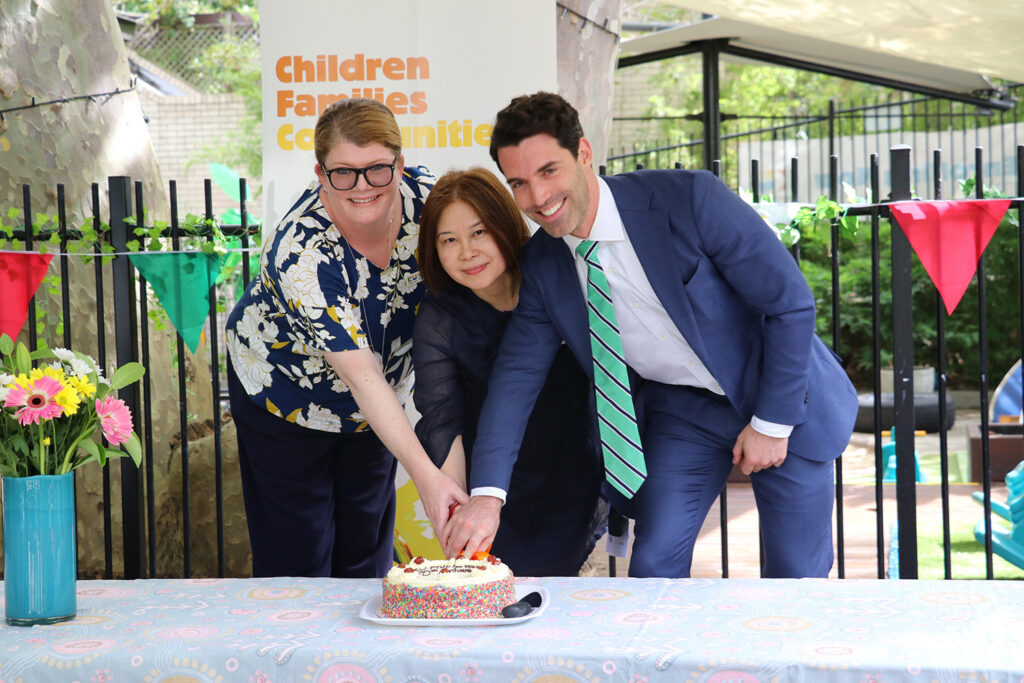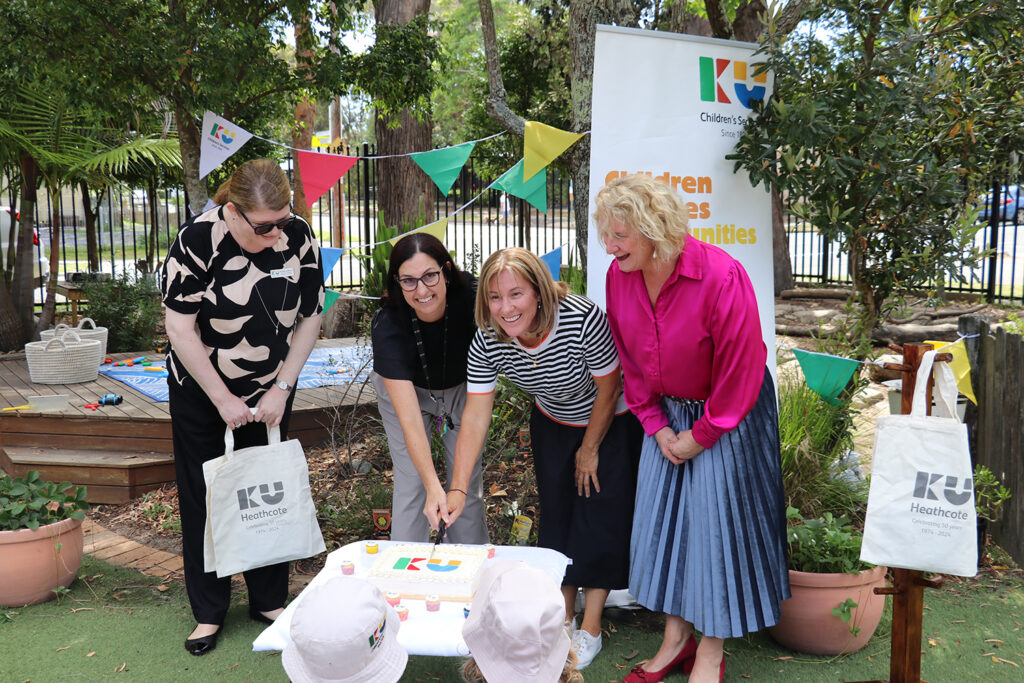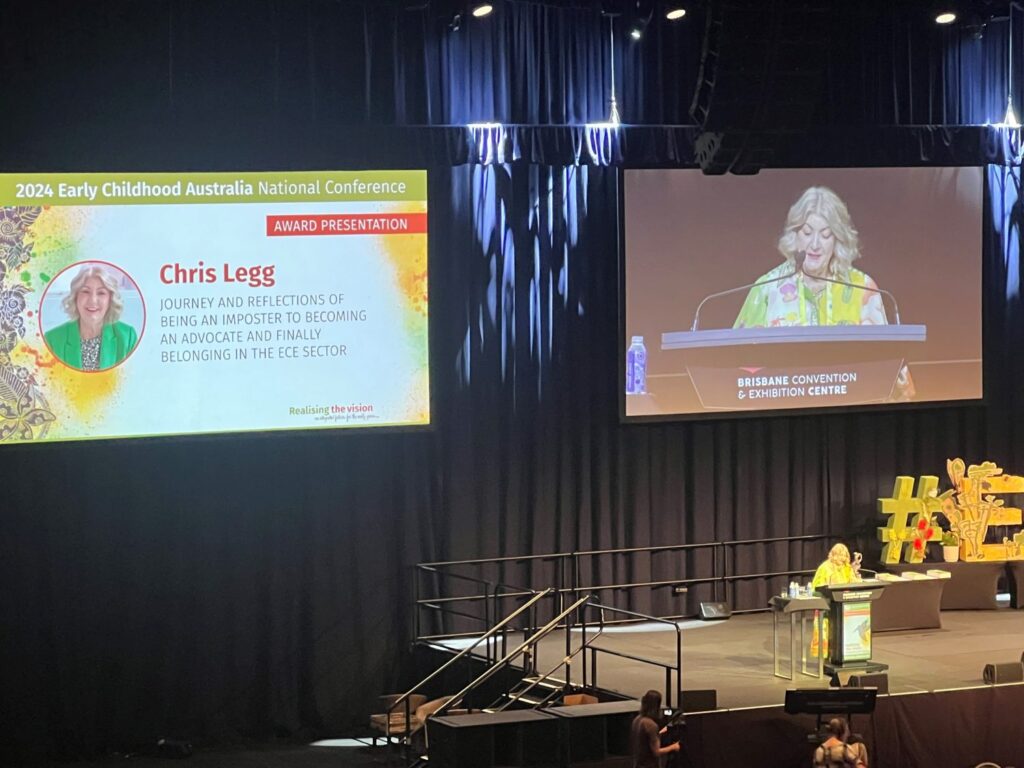This year 13 KU services were successful in receiving up to $1,000 in funding via Woolworths Junior Landcare Grants to support projects relating to sustainability.
The projects enhanced sustainable food production, waste management, native habitats and First Nations perspectives, and provided services with the opportunity to get hands-on with nature and play an active role in caring for the natural environment.
Read below to learn more about how each service used the grant to support children’s learning.

The project involved researching and purchasing plants that are native to the area and establishing them in places where previous plants had not thrived, that will over time enhance the natural spaces as they mature.
The preschool community built upon their knowledge and respect of the ways that First Nations people care for the land. The environmental and educational outcomes of the project included understanding the relationship between humans, the land and living things, how to care for them and how to use resources wisely.

The project ‘From Seed to Plate’ allowed children and staff to connect with the natural environment, learn about the process of growing vegetables and herbs, and develop a strong sense of agency. The project fostered strong partnerships with families by working together in planning the vegetable garden and organising working bees on Saturdays.
The children, staff and families at KU Ultimo recognise the importance of learning about sustainability and the value of fresh, home-grown produce. Everyone involved is eagerly anticipating the upcoming harvest of vegetables and herbs. It will be a rewarding experience for the children and an exciting opportunity for them to see the vegetables and herbs on the lunch table and the success of their learning journey.

KU Queanbeyan South Early Learning Centre
The project ‘Seed to Plate’ involved creating a vegetable garden so that all children could participate in growing vegetables. The service designed the area, and the children planted all the vegetables that they’re now watering and watching as they grow.

KU Mayfield has learnt so much about habitat and sharing their garden with other living things throughout this phase of the project. There are now so many native flowers for native bees and other pollinators and birds are starting to visit the garden. There’s been the excitement of the preschool’s resident blue tongue and the anticipation of a possum moving into their possum house. The children are always on the lookout for new garden visitors and the preschool can’t wait until their bush tucker grows so they can share it too.

KU Maidstone Children’s Centre
The aim of the project, ‘Herbs and Veggies’ was to promote knowledge and appreciation for growing and eating vegetables and herbs in young children. The children enjoyed planting vegetables and herbs with their chef Aferdita. The children helped dig the holes, plant each vegetable or herb and then water the plants after planting. The children planted carrots, snow peas and tomatoes.

Kooinda Workbase Child Care Centre
Kooinda’s project aimed to refresh and extend their edible food garden, incorporating both sustainable practices as well as learning about Aboriginal culture and the local native environment. The service was able to create new garden spaces to grow their own food for use in both cooking experiences and the kitchen menu, learning about traditional local Aboriginal bush tucker and the seasonal growth of their plants.

KU Kahibah Road Children’s Centre
With the support of the Woolworths Junior Landcare Grant, the children and staff at KU Kahibah Road began work on their long-term project ‘Welcome, Local Pollinators!’.
This project aims to create a ‘beneficial garden’ for local pollinating insects using native flowering plants. After some collaborative researching with the preschool children, teachers and educators, the service was able to identify local native flowers that could be planted in their gardens throughout their large outdoor play space that will encourage their local pollinators to visit.

KU Chatswood Community Preschool
The Woolworths Junior Landcare Grant enabled the preschool’s ‘Bee Block Project’ to reconnect and actively research with members of the community about the different species of bees, their habitats/characteristics and how important it is to be their friends and provide food for them so they can help us and our planet.
The children, teachers, educators and families at KU Chatswood Community Preschool are continuing to discover the plants and insects in their own backyard and surrounding community. The preschool aims to continue engaging with the local Willoughby City Council Community Centre and access the community garden.

KU Bilya Gulyangarri Preschool
The preschool’s project ‘Butterfly Garden’ involved building three garden beds and creating both ornamental and native gardens to draw butterflies and bees in.
The service sourced native plants from their local plant rescue so the plants are those that should be in the community. The preschool created networks and hope to attend a pollinator workshop as well. Families participated alongside the children to move soil and be involved in the project.

KU Ashmont Preschool and Family Centre
The ‘Community Bush Tucker Garden’ project supported community engagement and increased Aboriginal perspectives within the preschool. KU Ashmont built connections with not only the local community, but also with the local land. The children visited the local community hub to plant the bush tucker plants that were purchased through the grant funds. The service looks forward to tending to the garden each week and connecting with the local community.

KU Yagoona’s project aimed to build a vegetable garden so that all children in the preschool could participate in growing vegetables. The children will be involved in designing the new garden beds, growing the plants by seed, caring for the plants and, of course, harvesting and eating the produce!

KU Craigieburn Children’s Centre
The Woolworths Junior Landcare Grant has helped KU Craigieburn to transform their vision into reality. The gardening project ‘Strengthening Connections’ has supported children and staff to strengthen their connections with the land and First Nations Peoples. The experience has expanded children’s and team members’ knowledge about the native plants in the local area and how they can be used for food. As native plants require limited water to grow, it also supports the service in building on sustainability goals and saving water.

KU Faulconbridge Children’s Centre
KU Faulconbridge’s project ‘Bush Tucker Garden Trail’ aimed to continue to embed First Nations perspectives into their curriculum by revealing their vast knowledge of native plants and their uses – whether to eat, use for medicine, or attract native animals and insects.
The project encouraged everyone to build upon support through volunteers, as well as giving back to the community through the produce that’s grown in the bush tucker garden.






